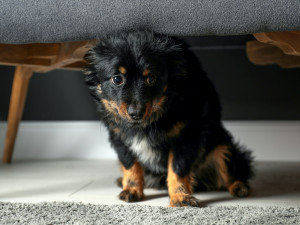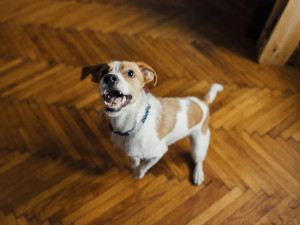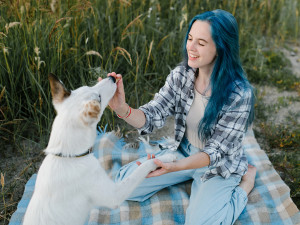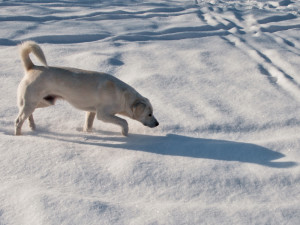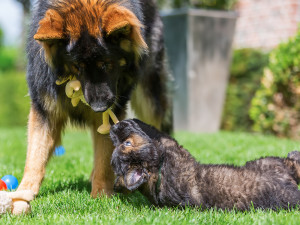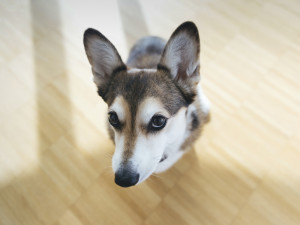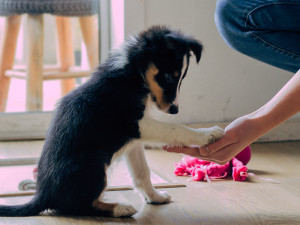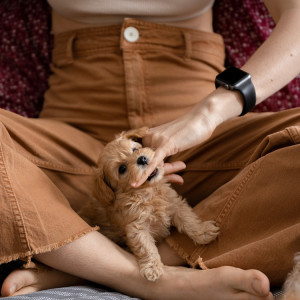Overexcited Dog? How to Calm A Dog Down
If your dog loses their sh*t over anything from a squirrel to a visitor, dog behaviourist Trish King has some tips
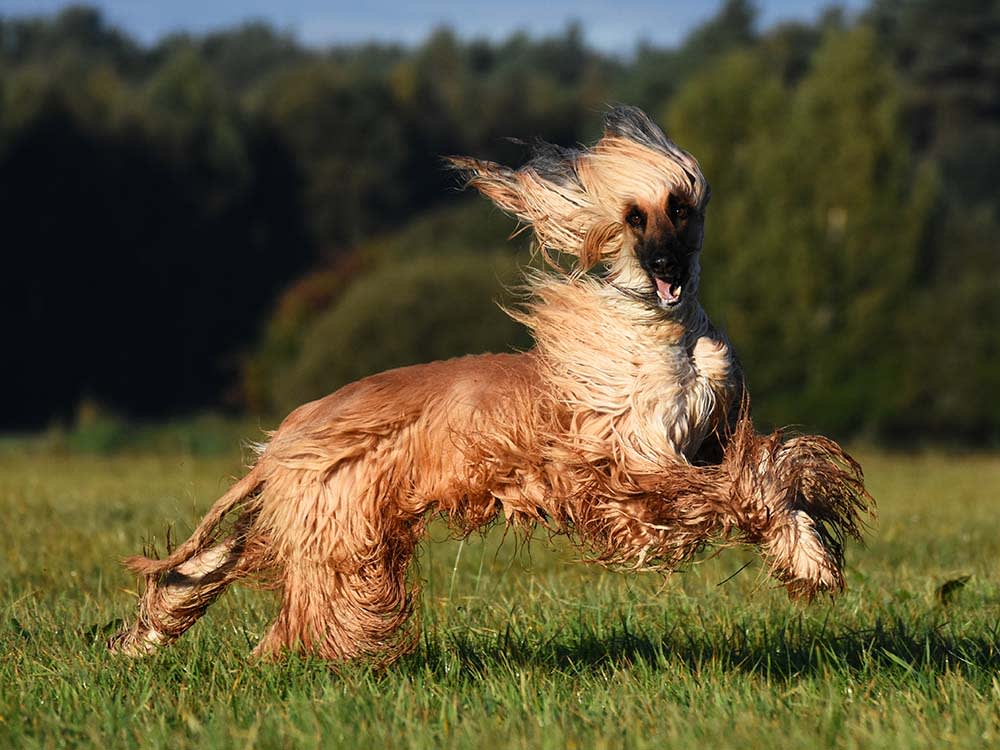
share article
One of our small dogs tends to get excited – very excited – when it’s time for a walk, or dinner, or play or pretty much anything that looks like it could be fun. She spends a lot of time in a state of eager anticipation – “Oh boy, what are we going to do now?!” If we’ve been quiet for a while, and then get up to do something, she does a happy dance. While it’s easy to assume a dog’s exuberance means they’re happy, the opposite may be true: over-excited dogs may be stressed and anxious, which can lead to behavioural issues. Here’s why dogs get overexcited, plus some tips for how to calm them down.
Overexcited dog? How to calm a dog down
It is important to be patient and consistent when trying to calm an overexcited dog. With time and patience, you can help your dog to learn how to relax and control their excitement. To calm an overexcited dog, create a calm environment, distract them, teach them a calming cue, massage them, speak in a calm voice, take them for a walk or give them a break.
Why dogs get overexcited
Anticipating something fires up the seeking circuit in the brain, which releases pleasurable chemicals, such as dopamine. When a dog hunts, for example, that circuit is activated. The dog enjoys the act of hunting, which would be excellent in the natural world, where hunting would be necessary for survival. If a dog didn’t want to hunt, they probably wouldn’t survive long. When you think about it, hunting is the ultimate anticipatory act.
People who train their dogs for sports often use the combination of eager anticipation and excitement for their own ends – retrieving, nosework, agility, dock-diving. It can, however, cause problems both in and outside the home if your dog gets overly excited or aroused when you don’t want them to.
This energy system is also activated when a dog is alarmed. At the sound of an unknown noise or unexpected sight, epinephrine (adrenaline) is released, preparing the body for action – either fight or flight. The heart rate increases, and blood is sent to the muscles needed for rapid movement and away from the surface of the skin.
So if the dog needs to fight, they won’t feel much pain until after the fight is over. If the dog needs to flee, they can go much faster and much further than they would if they weren’t pumped up with chemicals. Epinephrine is very good for animals in the wild, where an action not taken can end in death; however, it’s not always useful in our world. And it can take a long time for the dog to calm down after going into arousal (days even, for some dogs).
How overexcitement can cause chaos
One of the problems with arousal is that it appears to be addictive. When a dog sees another dog and goes into a state of excitement (whining, pulling on the leadopens in a new tab, sometimes barking), they might be anxious and alarmed – or they might be enjoying the dopamine rush. Sometimes the dog might start out being frightened, but over time they lose the fear and just go into eager anticipation, particularly when they can predict certain situations.
Some dogs might eagerly anticipate the third house on the block where they know a dog will be barking behind a fence. They’ll pull their human all the way there, and then bark and lunge at the fence. Often, they’ll bark at the fence, whether the other dog is there or not! These dogs are addicted to the high. You could probably give them whole steaks and they wouldn’t eat them – until they’ve finished barking.
Many dogs will sit at a window or in their yard and just wait, anticipating that a bird might land on a tree, or a squirrel may run along a fence. When that happens, their barking can be startling and, well, extremely annoying. If you tell your dog to stop, it generally won’t work. If you call your dog back and reward the recall, the barking will cease, but now you feel like you’re rewarding barking. If you don’t do anything, the behaviour will generally get worse. Most dogs don’t get used to the squirrels and stop responding to them because it feels so good to bark.
Think of arousal as a red cloud of energy that interferes with your dog’s judgement and causes poor behaviour. Sometimes arousal manifests as uncontrolled excitement, sometimes with a target (another dog, perhaps) or sometimes not (puppy rushes or zoomiesopens in a new tab). Sometimes it is sustained anticipation. No matter what, there doesn’t seem to be a lot of conscious thought going on while a dog is in that state, probably because the chemicals activated in their brains have little to do with thinking.
Arousal can lead to aggression toward other dogs, pets, or people and even major destruction. Many dog attacks are caused by arousal, often in conjunction with the predatory drive, which can also cause dogs to get out of control.
Although it’s probably not intentional, if you’re gone for 8–10 hoursopens in a new tab, it’s likely that you’re coming home to a bored and lonely dog. Your entrance might cause them to go into paroxysms of delight, racing around, picking up toys or balls, and/or leaping up on you. If, right after that, you take your dog out for exercise, you may compound that excitement.
How to calm an overexcited dog
Some dogs are naturally calmer than others, but you can help easily aroused dogs learn to inhibit their excitement and learn that other emotional states are a good thing. You can do this by analysing when your dog gets excited or anxiousopens in a new tab, and actively working to remove the stimulation or counteract it. Here are other tips for how to calm an over-excited dog:
1. Teach the dog a calming cue
In terms of training, obedience – sit, come, down, stay, polite walkingopens in a new tab – is always valuable, particularly if you practice on a daily basis, first in calm areas, and then in areas that might ordinarily excite your dog.
2. Train their nose
Teaching your dog to use their nose is also an excellent way to increase their focus and decrease excitability. Just tossing a bunch of dry dog food in the garden and then letting them search for it will help. At first, your dog will run madly around the garden, but as their instincts are honed, they’ll be able to show more concentration. Your dog’s nose is their primary sense – may as well use it.
3. Interrupt playtime
Interrupt your dog frequently during play – call them to you, have them sit, and then let them return to play. After their play session, make sure they relax before you start a new activity. If you take a dog out right after they’ve played enthusiastically, they’re likely to be ready for more action.
4. Stay calm yourself
Dogs can get overly aroused when you come home and greet them, so calm, matter of fact greetings – or no greetings at all – might help them calm down. And dogs can get extremely aroused when they think a walk is in the picture. Mixing up cues helps calm these dogs – picking up the lead and then putting it back down again, doing the same with keys, or reading your phone until the dog settles – are all ways to teach your dog that you’re not going anywhere until the energy is right. Dogs get very excited around meal times, so varying the time you serve meals will help them control their anticipation.
5. Practice relaxation
You can also show dogs how to relax and help them learn to enjoy it. Having your dog lie down, and then gently petting them will make relaxation reinforcing. Having them sit quietly while watching others in action can also be very helpful.
6. Reinforce with treats
One of the most useful techniques for Strider, a German Shepherd with lead reactivity, was having him lie down on his rug close to people playing dog sports like fly-ball and agility, both of which tend to be very active and noisy. At first, he got reinforced every few seconds with a treatopens in a new tab on the ground (where he had to look for it). After he learned to relax, we didn’t need to use the food reinforcement – just lying on his rug became enjoyable.
The bottom line: be prepared
Sometimes, despite our best efforts, our dogs go into an overly excitable mode. When they’re like this, pretty much anything can take them over the top, whether it’s a pigeon flying overhead, a dog walking at the other end of the road or a runner coming up from behind. Instant relaxation is obviously not possible, so what do you do?
First, it’s a good idea to prepare mentally for situations such as these. Ask yourself what you would do if a bicycle suddenly turned a corner ahead of you and zoomed past. Or if another excitable dog started barking at your dog. Often, just practicing a smooth move over and over again will take a lot of the impact away. Pulling a U-turn or moving to the side of the road can be effective. If your dog is already excited, then following the U-turn with some jogging might help move the energy in the direction you’d like. Remember, your dog doesn’t know they’re doing something ‘wrong’ – they’re just responding to stimulation in their environment.
Frequently asked questions
Are there calming products or tools available?
There are many products that can potentially help your dog calm down, ranging from licking mats to pheromone products to prescription medication.
What role does my behaviour play in my dog’s excitement level?
Dog owners can inadvertently increase their dog’s excitement level – it’s important to stay calm and keep your tone of voice neutral, especially when greeting your dog.
Is patience important in dealing with an overexcited dog?
Yes, patience is essential – when you’re patient when an overexcited dog, it will make you less reactive so you’re better able to respond to them calmly.
References
Trish King, CPDT, CCPDT
Trish established the Canine Behavior Academy at the Marin Humane Society. She has written a critically acclaimed book for dog owners, Parenting Your Dogopens in a new tab (TFH Publications), as well as numerous articles about dog and cat behavior for local and national newspapers and magazines.
Related articles
![Adult German Shepherd dog plays with a puppy on the lawn]() opens in a new tab
opens in a new tabDog Life Stages: Puppy Adolescence Is Only a Phase
Don’t worry, it’s just a phase!
![A dog looking up with a cute face]() opens in a new tab
opens in a new tabYour New Dog is Scared of You. Now What?
Five ways to warm a skittish dog to you
![Border Collie puppy shaking owner's hand]() opens in a new tab
opens in a new tabThe Go-To Training Schedule For Your Puppy
Your puppy training schedule, from eight weeks to six months. Let’s do this
![pet lover concept with mini dog on woman leg. sitting in room at home]() opens in a new tab
opens in a new tabWhat’s the Deal, Mouthy Puppies? Why Bite Inhibition Matters
How to teach your pup to play nice
